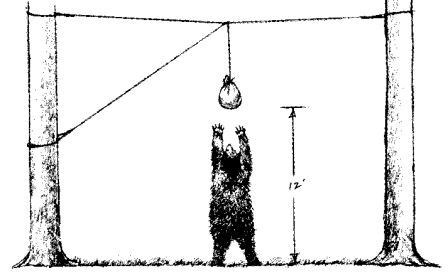
NPS Bears and other wildlifeBlack bears may be on any of the Apostle Islands, but are most common on Oak, Sand, Manitou, and Stockton islands. To avoid a close encounter with bears and other animals:
If you do encounter a bear: Never feed a bear or any other wildlife! Stay back at least 50 yards. In the backcountry: Back away while facing the bear. Avoid direct eye contact. Speak quietly, act passive, letting the bear know you are not a threat. If the bear approaches, wave arms and talk loader so the bear can identify you as a human. In a visitor use area (campsite, dock, picnic area): Make yourself look as large as possible and use a loud, strong voice. Bang pots, yell, and make noise until the bear leaves the area. Put away food and trash. Throwing small rocks in the direction of the bear should be done with caution -- you do not want to hit the bear! Please report the encounter to park staff as soon as possible. If the bear acts aggressively towards you: Leave the area immediately! Do not run. Report the encounter to park staff as soon as possible. WaterPotable water may be available at Little Sand Bay, Sand Island, and at Presque Isle Bay on Stockton Island during the busy season. Be prepared to boil water from the lake for at least two minutes or filter it with an adequate filter (0.4 microns pore size). Lake Superior, ponds and streams on the islands, do have waterborne organisms, such as Giardia l., which can cause severe intestinal disorders. Please do not dispose of any type of soap within 100 feet of any water source.Insects and TicksBiting insects, like mosquitoes, flies, and ticks, can be prevalent from June to September. Wearing long pants and long sleeved shirts provides some protection. Insect repellents are helpful. Ticks that carry Lyme disease and Ehrlichiosis are found in the park, so check yourself frequently. If you notice a rash, flu-like symptoms, or pain in the joints following a tick bite, call your physician!HuntingHunting activities do legally occur within the National Lakeshore. You may observe hunting activity during your visit from September to December. Contact a Park Ranger, or call 715-779-3397 ext. 2, for more information. |
Last updated: January 6, 2017
